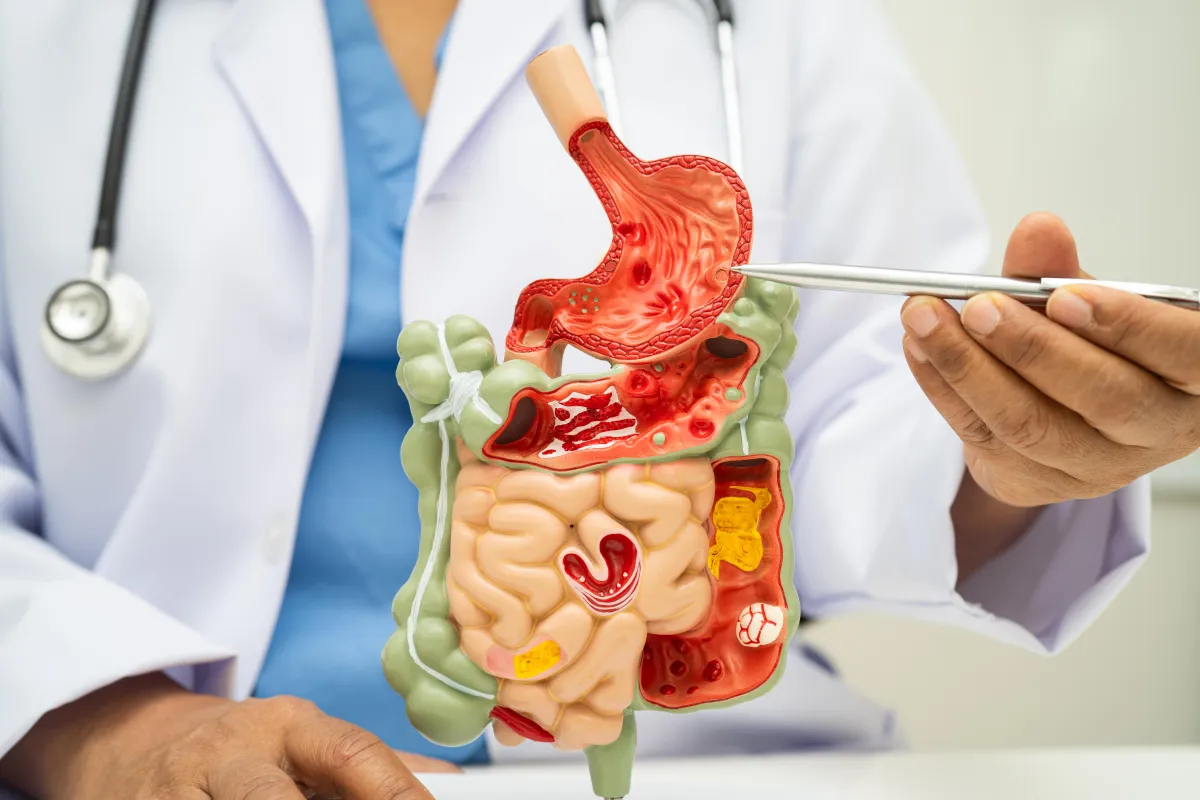Digestive illness: Gut Health
Digestive illnesses affect the gastrointestinal tract, with conditions like IBS, IBD, GERD, celiac disease, and food intolerances impacting digestion and overall health. Proper diagnosis and management are essential for symptom relief.

description digestive illness:
Digestive illnesses encompass a range of conditions that impact the gastrointestinal (GI) tract, including the esophagus, stomach, intestines, liver, pancreas, and gallbladder. These illnesses vary widely in their symptoms and causes.
Common digestive conditions include:
Irritable Bowel Syndrome (IBS): Characterized by abdominal pain, bloating, and altered bowel habits such as diarrhea or constipation. IBS is often related to stress, chronic inflammation, imbalanced gut microbiota, or food sensitivities. While IBS does not cause physical damage to the intestines, it can significantly affect quality of life.
Inflammatory Bowel Disease (IBD): Encompasses conditions like Crohn's disease and ulcerative colitis, involving chronic inflammation and the formation of ulcers in the digestive tract. Symptoms include abdominal pain and diarrhea along with psychological impacts such as depression and anxiety.
Gastroesophageal Reflux Disease (GERD): Occurs when stomach acid frequently backs up into the esophagus, causing irritation. Symptoms often include heartburn and chest discomfort.
Celiac Disease: An autoimmune disorder triggered by gluten, leading to damage in the small intestine and malabsorption of nutrients. This condition requires strict adherence to a gluten-free diet to manage symptoms.
Food Intolerances and Allergies: Adverse reactions to certain foods, with intolerances like lactose intolerance affecting digestion, while allergies can cause more severe immune responses, including gastrointestinal discomfort.
Functional Dyspepsia: Causes persistent upper abdominal discomfort, often without an identifiable underlying cause. Symptoms can include nausea, bloating, and an unpleasant feeling of fullness. These digestive disorders can have varying impacts from mild to severe and often require individualized diagnostic and therapeutic approaches. It is essential for those experiencing symptoms to seek professional medical advice for proper diagnosis and management.
role of gut imbalances in digestive illness
Gut imbalances, often referred to as dysbiosis, significantly contribute to digestive illnesses by disrupting the normal functioning of the digestive system.
Digestive Function:
A healthy balance of gut flora is crucial for efficient digestion and absorption of nutrients. When this balance is disrupted, the body struggles to break down essential nutrients like proteins, resulting in incomplete digestion. Consequentially, peptides such as casomorphines and gluteomorphines may enter the bloodstream, potentially affecting brain function and immune responses.
Cellular Health and Renewal: Gut bacteria are vital for the renewal and proper functioning of gut cells. An imbalance can lead to disordered cell renewal, increasing the risk of cancerous changes and interfering with normal food digestion and nutrient absorption.
Immune System Regulation: The gut microbiome plays a pivotal role in maintaining the immune system's balance, particularly between different immune components such as Th1 and Th2. An unhealthy gut flora can result in chronic infections, allergies, and autoimmune disorders, compromising the immune response's efficacy.
Leaky Gut Syndrome: Dysbiosis can damage the gut lining, causing it to become 'leaky.' This condition allows toxins and partially digested food particles to penetrate the bloodstream, triggering inflammatory responses and challenging the immune system.
Nutritional Deficiencies: A compromised digestive system often leads to nutritional deficiencies due to inefficient digestion and absorption, further weakening the immune system and overall health.
Pathogen Overgrowth: In the absence of beneficial bacteria, harmful pathogens can flourish, exacerbating existing gut issues and impacting the entire digestive process. In summary, gut imbalances disrupt both the structural and functional integrity of the gut, which can lead to a range of digestive disorders and impact overall health.
restore gut function and ease symptoms of digestive illness.
Restoring gut function and easing symptoms of digestive illnesses involves a comprehensive approach that focuses on diet, lifestyle changes, and sometimes supplements.
Here are some key steps to follow:
Dietary Adjustments: Implement an Introduction Diet like the GAPS (Gut and Psychology Syndrome) Diet. This diet is designed to heal and seal the gut lining by providing nutrients that promote the regeneration of a healthy gut lining and reduce inflammation. It includes foods rich in amino acids, gelatin, glucosamines, healthy fats, and vitamins.
Probiotics: Incorporate probiotic-rich foods and supplements to re-establish a healthy gut flora. Foods like homemade sauerkraut, fermented vegetables, and high-quality probiotic supplements are beneficial in promoting gut health.
Digestive Enzymes: Use digestive enzymes such as Betaine HCl and a full blend of pancreatic enzymes that assist in protein digestion, ensuring that your body can absorb nutrients effectively.
Mealtime Practices: Create a stress-free mealtime environment. Stress can inhibit digestion, so it's essential to maintain a relaxed pace during meals and avoid pressuring anyone, especially children, at the table.
Supplements: Consider using supplements like cod liver oil and essential amino acids such as tryptophan, glutamine, and asparagine, which support gut lining health and overall digestive function.
Introduce Foods Gradually: Start with easily digestible foods like well-cooked meats, organ meats, and raw egg yolks added to soups. Gradually increase the variety and richness of the diet as the gut heals.
Research and Experimentation: Some studies suggest that specific probiotics, like Lactobacillus reuteri, can inhibit gut pain sensors, potentially reducing discomfort.
Consult with Healthcare Professionals: It is crucial to consult with healthcare providers to address any underlying conditions, especially if symptoms are severe, and to tailor a gut health strategy that meets individual needs. By following these steps, individuals can support their gut function and potentially relieve symptoms of digestive illnesses. Remember, patience and consistency are key, and professional guidance is always recommended.
